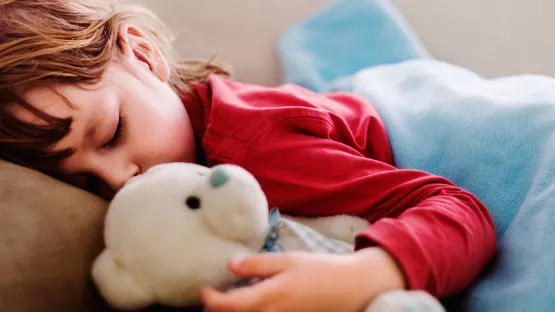8 Tips To Improve Your Child’s Digestive System
Poor eating habits can cause problems within your kid's digestive syst.... read more

Hello, mummy! Wondering how different your one-year-old child’s sleep patterns are? Well, they do change a bit once they hit the one-year mark. Your one-year-old is more aware of their surroundings, so distractions might affect their sleeping time. Their imaginations may start to interrupt sleep too.
Don’t fret, mummy. We’re going to help you establish a simple and consistent bedtime routine for your sleepy child.
How much sleep does my one-year-old need?
When your child is between the ages of one and two, they probably need about eleven to fourteen hours of sleep a day, including one or two naps during the daytime.
Once they hit eighteen months, or even sooner than that, most children have their two naps in one go, in an afternoon nap. A child who doesn’t nap in the morning will probably enjoy a very long afternoon nap.
Where should my one-year-old sleep?
Your child should still sleep in a bed space which is safe, secure and comfy. It’s recommended to get them a light blanket and several security items (known as lovies) - small soft blanket, stuffed animals, so your child can feel safe and comfy. But! Don’t put soft toys or stuffed animals that are too large. Your child might be a very curious adventurer and might step on these large toys in an attempt to “break out” of their bed.
Avoid things that have ties or strings - they could get tangled up with your child. Also, make sure the bed isn’t close to any curtains, window blind pulls, pictures or wall hangings - your child could get over excited and pull on any of these things.
My one-year-old still wakes up at night. What do I do?
Your one-year-old may start waking up at night. It could be due to discomfort, or it could be a very mild case of separation anxiety. Your child could be asking these questions: “Where is mummy? Where is daddy?”
This is also the time where dreams and nightmares can begin to affect them. Your child is still very young, so they will have a hard time trying to distinguish these dreams and nightmares from reality. Keep an eye of the things that your child sees before bedtime. Also, keep their lovies close by for reassurance and comfort.
Keep in mind that time spent with screens like a TV or tablet can disrupt a child’s sleep. Medical experts recommend limiting their screen time, keeping them away from digital devices with screens for at least an hour before bedtime, and not keeping such devices in their bedroom.
How can I help my one-year-old sleep better at night?
By now, you should have found the right combo for a good night sleep for your child. You’ve found things that have helped your child relax - like a nice lullaby. Set a routine that works for your child and stick to them. This helps your child get more sleep now, and it also helps establish discipline for bedtime.
Here’s a useful trick, should your child wake up in the middle of the night. Stay quiet, and still provide the reassurance that everything is alright, OK, and you are always close by. But keep it brief and boring, because too many nighttime visits can backfire, leading to an expectation from your child.
If you have an early bird in the crib, try to block out sunlight with curtains or blinds, at least for a while. Have a few toys inside the crib - these safe lovies should keep them busy in the early hours of the morning.
We hope these tips help you set out a sleeping routine for your growing child. But if your child seems to have any sleeping problems, like recurring nightmares, don’t hesitate to contact your doctor.


